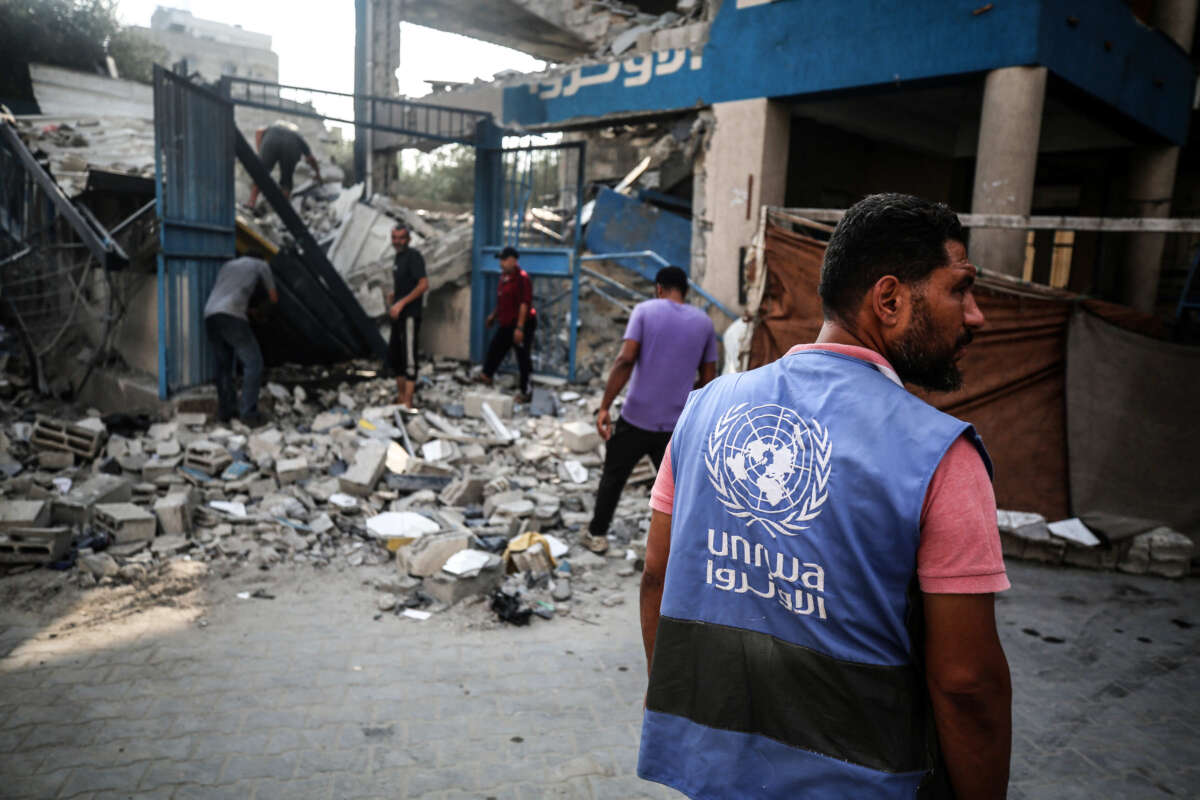On Tuesday, the Israeli Knesset passed legislation banning the main aid group for Palestinians from operating in the occupied Palestinian territories — a move that world leaders, humanitarian groups and the agency itself have warned will spell certain death for those starving amid Israel’s genocide and vastly erode Palestinians’ rights in the long term.
The two bills passed with overwhelming support from Israeli lawmakers, with only a handful of dissenters. One bill bans the UN Relief and Works Agency for Palestine Refugees (UNRWA) from providing services within Israel and the Palestinian territory, while the other declares UNRWA to be a “terror” group and bars interaction between the agency and the Israeli government.
Advocates have warned that the ban will worsen the already dire humanitarian catastrophe and famine in Gaza, while also depriving Palestinians in the occupied West Bank of crucial aid and services like education.
UNRWA head Philippe Lazzarini said that the bans are “unprecedented” and are tantamount to collective punishment of Palestinians — a crime under international law.
“These bills will only deepen the suffering of Palestinians, especially in Gaza where people have been going through more than a year of sheer hell. It will deprive over 650,000 girls and boys there from education, putting at risk an entire generation of children. These bills increase the suffering of the Palestinians and are nothing less than collective punishment,” the UNRWA head said.
As even some Israeli officials have warned, Lazzarini said that the bans are a violation of Israel’s membership within the UN and are a violation of the UN charter. UN Secretary-General António Guterres also said that the bills stand in contradiction to Israel’s obligations under the charter.
“UNRWA is the principal means by which essential assistance is supplied to Palestine refugees in the Occupied Palestinian Territory. There is no alternative to UNRWA,” Guterres said. “I call on Israel to act consistently with its obligations under the Charter of the United Nations and its other obligations under international law, including under international humanitarian law and those concerning privileges and immunities of the United Nations. National legislation cannot alter those obligations.”
UNICEF spokesperson James Elder said that the effects on children will be especially stark, and mean that the childrens’ rights agency will not be able to distribute supplies like vaccines, winter clothes, and hygiene kits.
“So, a decision such as this suddenly means that a new way has been found to kill children,” Elder said.
A slew of world leaders have condemned the legislation. In a joint statement ahead of the vote, the foreign ministers for Canada, Australia, France, Germany, Japan, Republic of Korea and the United Kingdom expressed “grave concern” over the legislation, saying that the legislation will have “devastating consequences” in Gaza in particular.
The U.S. has also reportedly pushed back against the passage of the bills — but remains the only country still withholding its donations to the crucial agency after Israel’s debunked accusations against it earlier this year.
Humanitarian groups that have worked on the ground with UNRWA in Gaza have said that the ban will severely undermine aid work, which has already been under fierce attack by Israeli forces.
“Israel has bombed Palestinians to death, maimed them, starved them, and is now ridding them of their biggest lifeline of aid,” said Oxfam in a statement. “Piece by piece, Israel is systemically dismantling Gaza as a land that is autonomous and liveable for Palestinians. Its banning of UNRWA today is condemnable and another step in this crime.”
As some advocates for Palestinian rights pointed out, Israel’s most recent attack on UNRWA is part of Israel’s long term strategy to target the UN and the very concept of international law in order to vastly erode the rights of Palestinian refugees, especially their right to return.
“The campaign to end UNRWA pre-dates 10/7/23 by decades, and has NOTHING to do with terror,” Foundation for Middle East Peace President Lara Friedman said. “It is and has always been about erasing Palestinians and Palestinian rights.”
Friedman pointed to an article she penned in 2018, in which she wrote that efforts to gut UNRWA are part of “unilateral action” by Israel, the U.S., and other actors “to re-define Palestinian refugees out of existence.”
Indeed, Lazzarini has also pointed out UNRWA’s importance for Palestinian rights. In an interview last month, Lazzarini said that Israel’s attacks are underlied by a disturbing political calculus.
“Ultimately, there is a desire to strip the Palestinian from the refugee status and, beyond that, also to undermine the future aspiration of the Palestinian for self-determination,” he said. “And that’s the reason why UNRWA has become such a target.”
Our most important fundraising appeal of the year
December is the most critical time of year for Truthout, because our nonprofit news is funded almost entirely by individual donations from readers like you. So before you navigate away, we ask that you take just a second to support Truthout with a tax-deductible donation.
This year is a little different. We are up against a far-reaching, wide-scale attack on press freedom coming from the Trump administration. 2025 was a year of frightening censorship, news industry corporate consolidation, and worsening financial conditions for progressive nonprofits across the board.
We can only resist Trump’s agenda by cultivating a strong base of support. The right-wing mediasphere is funded comfortably by billionaire owners and venture capitalist philanthropists. At Truthout, we have you.
We’ve set an ambitious target for our year-end campaign — a goal of $250,000 to keep up our fight against authoritarianism in 2026. Please take a meaningful action in this fight: make a one-time or monthly donation to Truthout before December 31. If you have the means, please dig deep.
